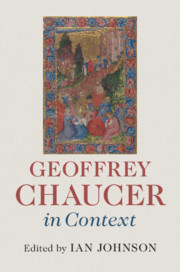Book contents
- Geoffrey Chaucer in Context
- Geoffrey Chaucer in Context
- Copyright page
- Contents
- Illustrations
- Contributors
- Abbreviations
- Introduction
- Part I Chaucer as Context
- Part II Books, Discourse and Traditions
- Chapter 3 Chaucer’s Linguistic Invention
- Chapter 4 Chaucer and London English
- Chapter 5 Manuscripts and Manuscript Culture
- Chapter 6 Chaucer’s Books
- Chapter 7 Authority
- Chapter 8 Literary Theory and Literary Roles
- Chapter 9 Metre and Versification
- Chapter 10 Dialogue
- Chapter 11 Romance
- Chapter 12 Love
- Chapter 13 Chaucer and the Classics
- Chapter 14 The French Context
- Chapter 15 The Italian Tradition
- Chapter 16 The English Context
- Chapter 17 Chaucer’s Competitors
- Chapter 18 Boethius
- Part III Humans, the World and Beyond
- Part IV Culture, Learning and Disciplines
- Part V Political and Social Contexts
- Part VI Chaucer Traditions
- Further Reading
- Index
Chapter 18 - Boethius
from Part II - Books, Discourse and Traditions
Published online by Cambridge University Press: 24 June 2019
- Geoffrey Chaucer in Context
- Geoffrey Chaucer in Context
- Copyright page
- Contents
- Illustrations
- Contributors
- Abbreviations
- Introduction
- Part I Chaucer as Context
- Part II Books, Discourse and Traditions
- Chapter 3 Chaucer’s Linguistic Invention
- Chapter 4 Chaucer and London English
- Chapter 5 Manuscripts and Manuscript Culture
- Chapter 6 Chaucer’s Books
- Chapter 7 Authority
- Chapter 8 Literary Theory and Literary Roles
- Chapter 9 Metre and Versification
- Chapter 10 Dialogue
- Chapter 11 Romance
- Chapter 12 Love
- Chapter 13 Chaucer and the Classics
- Chapter 14 The French Context
- Chapter 15 The Italian Tradition
- Chapter 16 The English Context
- Chapter 17 Chaucer’s Competitors
- Chapter 18 Boethius
- Part III Humans, the World and Beyond
- Part IV Culture, Learning and Disciplines
- Part V Political and Social Contexts
- Part VI Chaucer Traditions
- Further Reading
- Index
Summary
Sometimes called the ‘last of the Romans, first of the Scholastics’, Boethius (c.475–c.525) was among the most influential writers in medieval Europe. He devised a grand scheme to harmonize Aristotelian and Platonic thought, but he was best known for his prosimetric De consolatione philosophiae, which describes a dialogue between an imprisoned Boethius, falsely accused and awaiting execution, and the figure of Lady Philosophy. In alternating sections of prose and verse, she explains the transitory nature of earthly goods like wealth and fame and assures Boethius of the universe’s just, hierarchical order. Translated as the Boece by Chaucer, who drew on a French translation and Latin commentary sources as well as the Latin original, the Consolation and its ideas pervade his poetry, especially the Knight’s Tale and Troilus and Criseyde.
Keywords
- Type
- Chapter
- Information
- Geoffrey Chaucer in Context , pp. 147 - 154Publisher: Cambridge University PressPrint publication year: 2019
- 1
- Cited by

